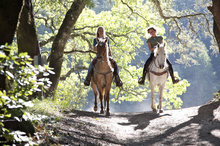The May Equine Expert publication from My Horse University eXtension included a column related to their webcast on Trail Riding Tips from their Trail Riding 101 online course presented by Betsy Greene, professor of animal science and Extension specialist, University of Vermont.

An enjoyable trail experience for horse and rider
When we put horses in an unknown environment with unknown events popping up (a backpacker turning the corner, a deer crossing a path) we should expect the inexperienced horse to spook.
Among those important tips were Does and Don'ts about working with a spooky horse both on an everyday basis and on the trail.
Horses will instinctively respond to a new sight, sound, smell or unexpected touch by fleeing. We typically refer to this as the fight or flight response, understanding that horses are here today due to their ability to flee dangerous situations in the wild.
When we put horses in an unknown environment with unknown events popping up (a backpacker turning the corner, a deer crossing a path) we should expect the inexperienced horse to spook. All good horsemen know that patience, consistency and appropriate use of the riderâs aids are needed to build confidence in a horse.
As a horse becomes more experienced and learns to trust the rider, a horse will develop its own sense of confidence and boldness in new situations. The following are some dos and donâts for dealing with a spooky horse on the trail.
- Do encourage your horse with confident aids using your hands, seat, legs and voice in unison to instill boldness in your horse.
- Do acknowledge a horseâs smallest effort to go towards a scary object by relieving some of the pressure from your aids or letting the horse stop and rest.
- Do take your time to introduce a horse to a new situation â patience now will pay off the next time the horse is in a similar situation.
- Do redirect your horseâs energy by flexing their head and moving their shoulders towards and then away from an unfamiliar object. By taking control of the horseâs movement, you can give them the confidence they need to get past the scary event.
- Do ride with a more experienced horse that will lead the way for your less experienced mount.
- Do start the inexperienced horse on short easy trails that are specific for equestrian use, then build up to more rustic and shared trails.
- Do practice at home going through puddles, over logs, and accustom your horse to loud noises and desensitize your horse to branches.
Donât:
- Donât punish a horse for spooking - you will simply reinforce that there really is something to be scared about.
- Donât try to comfort a horse for spooking with a lot of petting and soothing words â again you are just reinforcing the horseâs initial assumption that this is a really scary situation.
- Donât get off your horse unless you are in danger. You cannot lead a 1000 plus pound animal towards something if they really donât want to go.
- Donât get in a habit of letting your horse stop at every unfamiliar object or new situation. Your ultimate goal should be to have your horse confidently handle unfamiliar situations without slowing down the ride.
Tips - If your horse spooks on the trail, DO:
- Encourage your horse with confident aids
- Reward a horseâs smallest effort
- Be patient when riding in new situations
- Redirect your horseâs energy
- Ride with a more experienced horse
- Practice going over branches and mud at home
